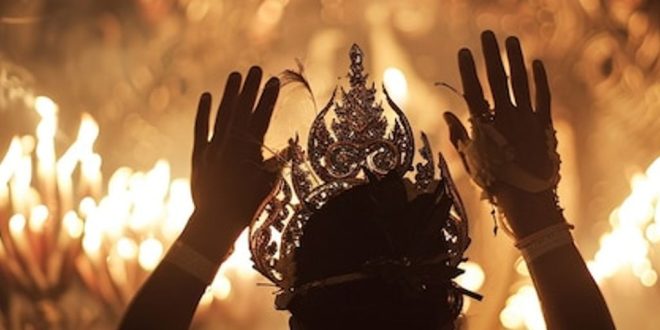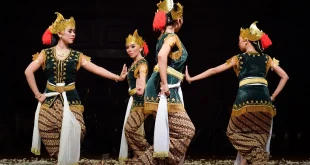Major Festivals
Indonesia is a vibrant tapestry of cultures and traditions, each with its own unique festivals that offer a glimpse into the country’s rich cultural heritage. These cultural festivals in Indonesia provide an opportunity for tourists and cultural enthusiasts to delve into Indonesian traditions and experience the vibrant festival celebrations firsthand. Let’s explore some of the major festivals that showcase the depth and diversity of Indonesian events and traditional ceremonies.
Bali Arts Festival: Celebrating Balinese Culture
The Bali Arts Festival is a month-long celebration held annually in Denpasar, the capital of Bali, showcasing the island’s rich cultural heritage. This festival is a feast for the senses with a plethora of performances, exhibitions, and cultural activities that highlight Balinese music, dance, and art.
- Practical Tips: Plan your visit to align with the festival dates, typically from mid-June to mid-July. The festival is popular, so booking accommodations in advance is recommended. Engage with local guides to gain deeper insights into the performances and their cultural significance.
- Cultural Insights: The festival opens with a grand parade, featuring traditional Balinese costumes and performances. It is an excellent opportunity to witness the revival of classical Balinese arts, along with contemporary interpretations by young artists.
- Examples: Dance dramas such as the Legong and Barong are performed, offering a narrative of Balinese mythology and history. Art exhibitions and craft workshops provide a hands-on experience of Balinese craftsmanship.
For more information on visiting Bali and other destinations, check out Best Tourist Destinations in Indonesia.
Java’s Grebeg Maulud: Traditional Islamic Festivities
Grebeg Maulud is celebrated in Yogyakarta and Surakarta (Solo) on the island of Java, marking the birth of the Islamic prophet Muhammad. This festival is a blend of Javanese and Islamic traditions and is renowned for its grand processions and spiritual ceremonies.
- Practical Tips: The festival is linked to the Javanese calendar, often falling in the Islamic month of Rabi’ al-awwal. Check the local calendar to ensure accurate timing for your visit. Participating in local tours can provide a structured way to experience the events.
- Cultural Insights: The festival features a royal procession from the Sultan’s palace, with offerings known as “gunungan” (mountain-like structures made of food) that are paraded and later distributed to the public, symbolizing prosperity and blessing.
- Examples: Traditional gamelan music and Javanese dances accompany the procession, and local markets spring up around the event, offering a variety of traditional foods and crafts.
Toraja Funeral Ceremony: Unique Cultural Traditions
The Toraja Funeral Ceremony in South Sulawesi is a unique cultural tradition that reflects the Toraja people’s beliefs in the afterlife. These ceremonies are elaborate events that can last several days, involving rituals, music, and buffalo sacrifices.
- Practical Tips: Ceremonies are held year-round, but the peak season is in July and August. Respect local customs and dress modestly. Hiring a local guide is advisable to navigate the cultural nuances and language barriers.
- Cultural Insights: For the Toraja, death is a transition to the afterlife, and funerals are seen as a celebration of life. The ceremony involves intricate dances and chants, with family and community members playing significant roles.
- Examples: The burial sites, often carved into cliffs or placed in cave tombs, are adorned with effigies called “tau tau,” representing the deceased. This practice highlights the Torajans’ connection with their ancestors and the land.
For more health and travel-related tips, visit Your Health Tips Articles and Health, Home and Travel Tips.
These cultural festivals in Indonesia not only offer a window into the country’s diverse cultural heritage but also provide memorable experiences for those eager to understand and appreciate Indonesian traditions. Engaging in these festival celebrations allows tourists and cultural enthusiasts to immerse themselves in the vibrant tapestry of Indonesian events and traditional ceremonies.
Understanding the Heritage Behind the Festivals
Cultural Significance of Indonesian Festivals
Cultural festivals in Indonesia offer a vibrant tapestry of traditions, ceremonies, and events that embody the rich cultural heritage of the nation. These festivals are not merely occasions for celebration but are deeply rooted in the Indonesian traditions and serve as a gateway to understanding the country’s cultural heritage. Each festival is a reflection of the community’s identity, beliefs, and historical experiences, passed down through generations.
Indonesian Traditions and Festival Celebrations
Indonesia’s cultural festivals often highlight traditional ceremonies that showcase the diverse customs of its many ethnic groups. For example, the Bali Arts Festival is a month-long event that celebrates Balinese culture through dance, music, and art. This festival provides an immersive experience into the Balinese way of life, offering tourists and cultural enthusiasts a chance to participate in traditional Balinese rituals and witness unique performances. Learn more about the Bali Arts Festival Celebration Balinese Culture.
Another significant event is the Yogyakarta Art Festival, which features traditional Javanese performances, art exhibitions, and local crafts. This festival is a testament to the rich cultural tapestry of Java, providing a platform for local artists to showcase their talents while preserving their cultural heritage.
Indonesian Events and Traditional Ceremonies
Attending these festivals allows tourists to witness firsthand the vibrant Indonesian events that are central to the cultural landscape. For instance, the Toraja Funeral Ceremony is a unique event celebrated in Sulawesi, characterized by elaborate rituals that honor the deceased. This ceremony is a profound manifestation of the Torajan belief system and their relationship with the afterlife, offering cultural enthusiasts an opportunity to deepen their understanding of Torajan customs.
Similarly, the Nyepi Day, or the Balinese Day of Silence, is a unique cultural heritage event celebrated in Bali. Unlike typical festivals, Nyepi is marked by silence, fasting, and meditation, inviting participants to reflect on the year past and prepare for the year ahead.
Practical Tips for Experiencing Cultural Festivals
To fully appreciate the cultural significance of these festivals, it is important for tourists to plan their visits around these events. Here are some practical tips:
- Research Festival Dates: Many festivals are tied to the lunar calendar or specific agricultural cycles. Planning ahead by checking the dates and locations of Indonesian events can enhance your experience. Best Tourist Destinations in Indonesia.
- Respect Local Customs: Understanding and respecting the customs associated with each festival is crucial. This includes dressing appropriately, participating respectfully in traditional ceremonies, and being mindful of local traditions.
- Engage with the Community: Interacting with locals can provide deeper insights into the cultural heritage and significance of the festivals. Joining guided tours or workshops can also enhance your understanding.
- Health and Safety: Ensure your health and safety by following local guidelines and advice during festival celebrations. For health tips during travel, refer to Your Health Tips Articles and Health, Home and Travel Tips.
By immersing themselves in these cultural festivals, tourists and cultural enthusiasts can gain a profound appreciation for Indonesian traditions and the cultural heritage that defines this diverse archipelago.
Must-Visit Events for a Rich Cultural Experience
Indonesia is a land of vibrant cultures and diverse traditions, with a calendar full of festivals that offer tourists and cultural enthusiasts an immersive experience into the heart of Indonesian traditions. If you’re planning to explore the cultural festivals in Indonesia, this guide will introduce you to some of the must-visit events that promise a rich cultural experience.
Bali Arts Festival: A Celebration of Balinese Culture
The Bali Arts Festival is a month-long celebration that showcases the rich cultural heritage of Bali. Held annually in Denpasar, this festival is a spectacular display of Balinese music, dance, and traditional ceremonies. Visitors can witness traditional performances, art exhibitions, and parades, offering a deep dive into Balinese cultural expressions.
For more information, read our detailed guide on Bali Arts Festival Celebration Balinese Culture.
Yogyakarta’s Sekaten: A Traditional Ceremony with Historical Significance
Sekaten is an ancient Javanese festival celebrated in Yogyakarta, commemorating the birth of Prophet Muhammad. This festival highlights the fusion of Islamic and Javanese traditions, featuring gamelan music, cultural performances, and traditional markets. It’s an excellent opportunity for tourists to experience Indonesian events that blend religious and cultural heritage.
Toraja Funeral Ceremony: A Unique Cultural Heritage Experience
In Tana Toraja, South Sulawesi, the Toraja Funeral Ceremony is a traditional ceremony that tourists often find both intriguing and enlightening. This event, known for its elaborate ritualistic practices, is an important aspect of the Torajan cultural heritage. Visitors can observe the community’s unique customs and beliefs about life and death, providing a profound cultural understanding.
Pasola in Sumba: A Festival Celebration of Valor and Tradition
The Pasola festival in Sumba is a thrilling spectacle that involves mock battles on horseback. This festival is tied to the local Marapu belief system and marks the rice planting season. It’s a vivid demonstration of Indonesian traditions, where participants engage in a display of skill and bravery, attracting visitors who are keen on exploring traditional ceremonies.
Reog Ponorogo: A Theatrical Extravaganza in East Java
Reog Ponorogo, originating from East Java, is one of Indonesia’s most captivating cultural festivals. This theatrical performance features elaborate costumes, traditional music, and dance, telling stories rooted in local folklore. Attending the Reog Ponorogo offers tourists a chance to witness the artistic prowess and cultural depth of Indonesian events.
Practical Tips for Experiencing Cultural Festivals in Indonesia
- Plan Ahead: Research festival dates and locations to align your travel itinerary. Websites like Best Tourist Destinations in Indonesia can provide additional guidance.
- Cultural Sensitivity: Respect local customs and dress codes. Understanding and appreciating cultural nuances can enhance your festival experience.
- Health Precautions: Consider reading health tips on Your Health Tips Articles to stay prepared for the trip.
- Stay Informed: Check local travel advisories and guidelines on Health, Home and Travel Tips to ensure a safe visit.
Exploring Indonesia’s cultural festivals offers a window into the nation’s rich tapestry of traditions and ceremonies. Whether you’re captivated by the vibrant arts of Bali or the age-old rituals in Toraja, these festivals promise an unforgettable cultural journey.
How to Plan Your Visit During Festival Seasons
Understanding Cultural Festivals in Indonesia
Cultural festivals in Indonesia offer a vibrant glimpse into the nation’s rich tapestry of traditions and heritage. From the Bali Arts Festival Celebration Balinese Culture(/bali-arts-festival-celebration-balinese-culture) to the mesmerizing Toraja Funeral Ceremony, these festivals provide unique opportunities to witness Indonesian traditions firsthand. Planning your visit around these events can enhance your travel experience, allowing for deeper cultural appreciation and understanding.
Research Festival Dates and Locations
To effectively plan your visit, start by researching the dates and locations of the festivals you wish to attend. Many Indonesian events, such as the Galungan and Nyepi in Bali, follow the Balinese lunar calendar, which can differ from the Gregorian calendar. Websites like Health, Home and Travel Tips(https://www.jurumedia.my.id/) often provide updated festival calendars and travel tips. Ensuring you have accurate information will help you align your travel plans with these spectacular festival celebrations.
Book Accommodations Early
Festival seasons attract tourists and cultural enthusiasts from around the world, leading to high demand for accommodations. To secure the best options, book your stay well in advance. Consider eco-friendly hotels that align with sustainable tourism practices. This is especially crucial in popular areas like Bali and Yogyakarta, where traditional ceremonies draw large crowds. Check Best Tourist Destinations in Indonesia(https://lokasiku.my.id/best-tourist-destinations/) for recommended places to stay.
Embrace Indonesian Traditions and Etiquette
Immersing yourself in the cultural heritage of Indonesia requires a respectful understanding of local customs. Dress appropriately for festival events, often in modest or traditional attire, and be mindful of local etiquette. For instance, during religious ceremonies, it is customary to remove your shoes and dress conservatively. Engaging respectfully with the culture enhances your experience and demonstrates appreciation for the host community.
Plan for Health and Safety
Staying healthy and safe while attending festivals is crucial. Indonesian festivals can be crowded and overwhelming, so plan for adequate hydration and nutrition. Make use of Your Health Tips Articles(https://cosiv.net/) for advice on maintaining health while traveling. Additionally, ensure you have adequate travel insurance and stay informed about any health advisories or necessary vaccinations.
Engage with Local Communities
To gain a deeper understanding of the cultural nuances, engage with local communities. Participate in workshops or volunteer at festival events to learn about the intricate details of traditional ceremonies. This interaction not only enriches your travel experience but also supports the preservation of cultural heritage.
Optimize Your Travel Itinerary
When planning your itinerary, consider incorporating other activities around the festivals to maximize your experience. Explore nearby attractions such as Indonesia’s islands and beaches or indulge in the country’s culinary tourism. This approach ensures a well-rounded trip that combines cultural exploration with relaxation and adventure.
By following these practical tips, tourists and cultural enthusiasts can plan an enriching journey to experience the vibrant cultural festivals in Indonesia. With careful planning and an open heart, these events offer unforgettable insights into the country’s diverse cultural landscape.
This content is structured to guide tourists and cultural enthusiasts in planning their visits around Indonesian festivals, ensuring they gain meaningful insights and experiences. The use of internal and external links provides additional resources for deeper exploration, while LSI keywords are integrated naturally to enhance SEO.
Embrace the Diversity of Indonesian Culture
Cultural Festivals in Indonesia
Indonesia, with its rich tapestry of more than 17,000 islands, is a melting pot of diverse cultures, traditions, and festivals. Each of these cultural festivals in Indonesia offers a unique glimpse into the nation’s vibrant heritage, providing travelers and cultural enthusiasts an opportunity to immerse themselves in authentic experiences. Whether it’s the rhythmic beats of the Bali Arts Festival Celebration Balinese Culture or the captivating traditional ceremonies of Toraja, these festivals are a testament to Indonesia’s cultural heritage.
Indonesian Traditions and Festival Celebrations
Indonesian traditions are deeply woven into the fabric of its festival celebrations. For instance, the Nyepi Day in Bali, a day of silence, fasting, and meditation, allows visitors to experience the spiritual tranquility of Balinese culture. Similarly, the Pasola Festival in Sumba, featuring traditional war games, showcases the island’s ancient martial traditions.
When planning to attend these festivals, it’s essential to research the specific dates and locations, as they can vary each year. Engaging with local communities during these events can provide deeper insights into their customs and beliefs. More information on the best times and places to visit can be found in our Best Tourist Destinations in Indonesia.
Indonesian Events and Traditional Ceremonies
Participating in Indonesian events and traditional ceremonies offers a deeper appreciation for the country’s cultural diversity. The Sekaten Festival in Yogyakarta, for example, is a celebration of Javanese culture with music, dance, and traditional food, reflecting Indonesia’s rich culinary heritage. The Baliem Valley Festival in Papua is another must-see, where tribes from the region come together for a week of cultural exchange through dance, music, and traditional games.
To make the most of these experiences, tourists are encouraged to respect local customs and dress codes, often required during ceremonies. Engaging with locals and understanding the significance behind each event can greatly enhance the experience.
Cultural Heritage and Travel Tips
Embracing the cultural heritage of Indonesia goes beyond mere observation; it involves active participation and a genuine appreciation for the traditions that define the nation. Here are some practical tips for travelers:
- Plan Ahead: Research festival dates and plan your itinerary around them. Websites like Health, Home and Travel Tips offer valuable insights into travel planning.
- Learn Basic Phrases: While many Indonesians speak English, learning a few basic phrases in Bahasa Indonesia can greatly enhance your interactions with locals.
- Respect Local Customs: Each region may have specific customs and etiquette. Observing and respecting these can lead to more meaningful cultural exchanges.
- Stay Healthy: Festivals can be physically demanding. Stay hydrated, use sunscreen, and observe health tips from reliable sources such as Your Health Tips Articles.
- Engage with Locals: Participate in workshops, cooking classes, or guided tours to gain a deeper understanding of the cultural nuances.
By embracing these experiences with an open mind and respectful attitude, tourists and cultural enthusiasts can truly appreciate the diversity of Indonesian culture. Whether you are attending a grand festival or a small village ceremony, each event offers a unique opportunity to connect with Indonesia’s rich and dynamic cultural landscape.
FAQ
What are the major cultural festivals in Indonesia?
Indonesia, with its diverse cultural heritage, hosts numerous vibrant festivals throughout the year. Some of the major cultural festivals include:
- Nyepi: Known as the Day of Silence, celebrated by the Balinese Hindus, it marks the Balinese New Year. The entire island of Bali shuts down for a day of silence, fasting, and meditation.
- Bali Arts Festival: This month-long festival held in Denpasar showcases Bali’s rich arts and culture, featuring traditional dance, music, and crafts.
- Waisak: Celebrated at the Borobudur Temple in Central Java, this Buddhist festival commemorates the birth, enlightenment, and death of Gautama Buddha with rituals and lantern releases.
- Pasola: A traditional festival of the Sumba people involving ritualistic battles on horseback, celebrated in West Sumba.
- Toraja Funeral Ceremony: In South Sulawesi, the Toraja people hold elaborate funeral ceremonies, which are significant cultural and social events.
- Dieng Culture Festival: Held in Central Java, this festival features traditional performances, jazz concerts, and the unique ritual of cutting the dreadlocks of children believed to have supernatural powers.
How do these festivals reflect Indonesian traditions?
Indonesian festivals are a rich tapestry of the country’s cultural and spiritual traditions, reflecting the deep-rooted customs and beliefs of its people.
- Nyepi: Reflects the Balinese Hindu philosophy of Tri Hita Karana, which seeks harmony among humans, nature, and the divine.
- Bali Arts Festival: Celebrates and preserves Bali’s traditional arts, showcasing the island’s unique cultural identity and creativity.
- Waisak: Embodies the spiritual and religious devotion of Indonesia’s Buddhist community, promoting messages of peace and enlightenment.
- Pasola: Highlights the martial traditions and ritual significance of the Sumba community, serving as a symbolic act of gratitude and hope for a bountiful harvest.
- Toraja Funeral Ceremony: Represents the social structure and cultural values of the Toraja people, emphasizing respect for ancestors and community ties.
- Dieng Culture Festival: Demonstrates the blend of cultural heritage and community belief systems, highlighting unique local traditions and folklore.
What are the must-visit festivals for tourists?
For tourists seeking to immerse themselves in Indonesia’s cultural richness, the following festivals are must-visits:
- Nyepi in Bali: Experience the unique silence and the stunning Ogoh-Ogoh parade held the day before Nyepi.
- Bali Arts Festival: A great opportunity to witness a wide array of traditional Balinese performances and arts.
- Waisak at Borobudur: Join thousands of pilgrims in a serene and spiritual atmosphere during the lantern release.
- Pasola in Sumba: Engage with the local traditions and witness the thrilling horseback battles.
- Toraja Funeral Ceremony: Though a somber occasion, it offers a profound insight into the Toraja cultural and spiritual practices.
- Dieng Culture Festival: Enjoy the mix of cultural performances and the mystical dreadlock-shaving ritual, set against the backdrop of the Dieng Plateau’s stunning landscapes.
 Lokasiku Your reference for travel in Indonesia
Lokasiku Your reference for travel in Indonesia 


